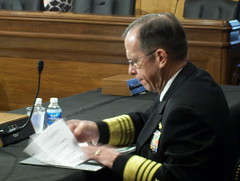Thursday
Sep172009
A Civilian Surge May Be The Key To Success In Afghanistan, Says Foreign Analyst
By Meagan Wiseley - University of New Mexico, Talk Radio News Service
Dr. Clare Lockhart, Co-Founder and Director of the Institute of State Effectiveness, spoke out in favor of a civilian surge, which would indicate massive support from the Afghan people, in Afghanistan Thursday during an appearance before the Senate Foreign Relations Committee.
According to Lockhart, a civilian surge can be achieved in Afghanistan by enabling Afghans to exercise self rule through the creation of civil institutions.
"[These institutions will provide the] framework needed to stabilize Afghanistan," said Lockhart.
Lockhart added that this move would be an essential step to achieving an eventual exit.
Chairman John Kerry (D-Mass.) emphasized the importance of a winning civilian strategy in Afghanistan.
"I have said repeatedly that we will not force the surrender of the Taliban by military force alone. Therefore, any strategy that lacks a strong civilian component is doomed," said Kerry.
Dr. Clare Lockhart, Co-Founder and Director of the Institute of State Effectiveness, spoke out in favor of a civilian surge, which would indicate massive support from the Afghan people, in Afghanistan Thursday during an appearance before the Senate Foreign Relations Committee.
According to Lockhart, a civilian surge can be achieved in Afghanistan by enabling Afghans to exercise self rule through the creation of civil institutions.
"[These institutions will provide the] framework needed to stabilize Afghanistan," said Lockhart.
Lockhart added that this move would be an essential step to achieving an eventual exit.
Chairman John Kerry (D-Mass.) emphasized the importance of a winning civilian strategy in Afghanistan.
"I have said repeatedly that we will not force the surrender of the Taliban by military force alone. Therefore, any strategy that lacks a strong civilian component is doomed," said Kerry.




 Thursday, September 17, 2009 at 3:15PM
Thursday, September 17, 2009 at 3:15PM

U.S. Envoy To Sudan Requests Lifting Sanctions
Major General Scott Gration, a U.S. special envoy to Sudan, discussed a comprehensive strategy for that nation in preparation of UNAMID’s 2011 peace referendum and Sudan’s April 2010 elections.
“We want a country that is governed responsibly, justly, democratically, a country that’s at peace with itself and its neighbors, that’s economically viable, a country that works together with the United States in common interests,” Gration said in an address to the Senate Foreign Relations Committee Thursday.
In order to meet these objectives, “we need some space on sanctions,” he said, calling on Congress to help lift sanctions that restrict access to certain Sudanese ports. Such sanctions, he said, block access of trains carrying essential equipment and personnel for health care and education. They “are hindering me from being able to bring development to the south,” he added.
Gration said he believes that by establishing an environment that helps leaders in the north and south of Sudan reach twelve areas of agreement of the Comprehensive Peace Agreement, the U.S. can help Sudan reach a major milestone on the road to peace. “We created the environment so that the two parties, NCP and SBLN, could make the agreements,” Gration explained.
“It’s getting significantly better, but that doesn’t mean that we need to stop our efforts,” he said.
In addition to lifting sanctions, “we need more people,” Gration said. He recently requested three additional full-time employees from the U.S. State Department of State to assist him in fostering peace in Sudan.